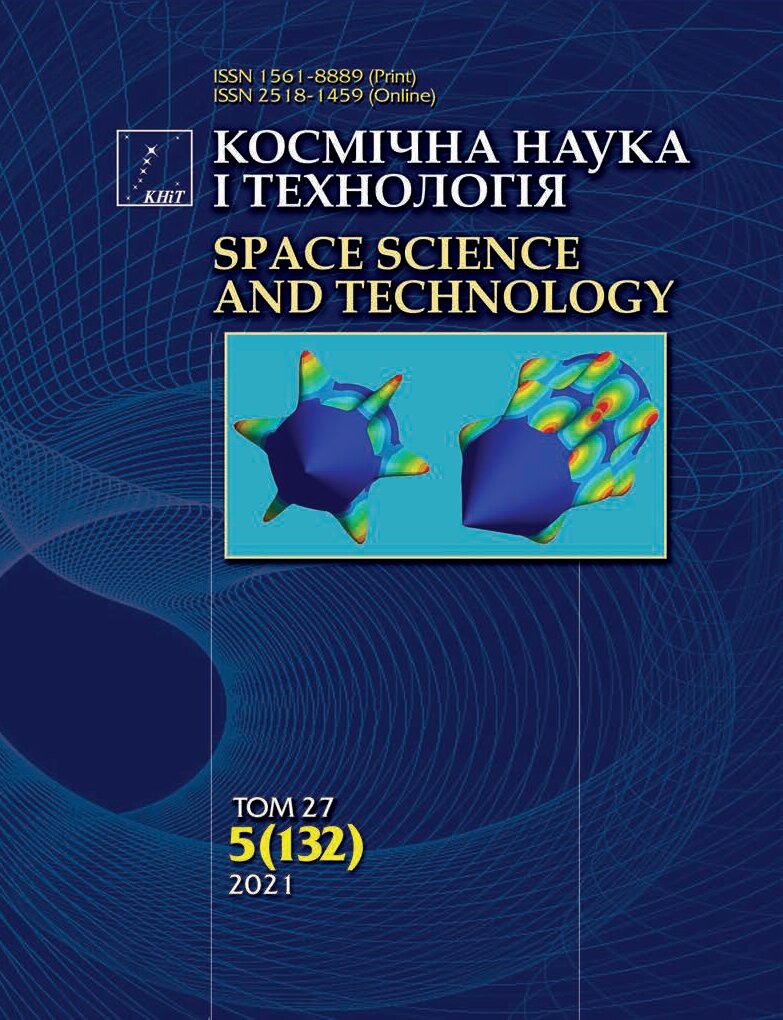Feed-forward control of total retrieval of the space tether from vertical position
DOI:
https://doi.org/10.15407/knit2021.05.071Keywords:
elastic space tether, feed-forward control, retrieval, underactuated mechanical systemAbstract
This paper presents the results of studies of the feasibility of total and safe retrieval of a space tether of two bodies connected by an elastic, massless cable. The purpose of the research is to build up the control for the mode of the total and safe retrieval of the tether, which is one of the basic modes of its functioning. It allowed the development of the feed-forward control of the tether length or tension that provides demanded change of the angular momentum of the tether under the effect of the gravitational torque. The novelty of the research results consists also in the novel approach to the control of underactuated mechanical systems, which have the number of the control channels less than their degrees of freedom. Here the constraints on the tether angular motion relative to the pitch axis are introduced. They reduce the number of the system degrees of freedom and allow realizing the necessary mode of motion. For this control, only the remaining degree of freedom is used. The numerical simulation of the effect of the mode parameters on the tether motion is carried out for the tether in the chosen ranges of the parameters. The numerical example demonstrates the simplicity of the application of the method in practice. Plots illustrate the analysis of the results.
References
Banerjee A. K., Kane T. R. (1982). Tether deployment dynamics. J. Astronaut. Sci., 30, 347—366.
Banerjee A. K., Kane T. R. (1984). Tethered satellite retrieval with thruster augmented control. JGCD, No.7, 45—50.
https://doi.org/10.2514/3.8543
Barkow B. (2003). Controlled deployment of a tethered satellite system. Proc. in Appl. Math. and Mech.,2, 224—225.
https//doi.org/ 10.1002/pamm.200310097
Barkow B., Steindl A., Troger H., Wiedermann G. (2003). Various methods of controlling the deployment of a tethered satellite. J. Vibration and Control., 9, 187—208.
https://doi.org/10.1177/107754603030747
Beletsky V. V. (1966). Motion of an artificial satellite about a center of mass. Jerusalem: Israel Programm for Scientific Translations
Beletsky V. V., Levin E. M. (1993). Dynamics of space tether systems. San Diego: Univelt.
Clohessy W. H., Wiltshire R. S. (1960). Terminal guidance system for satellite rendezvous. JGCD, 27, 653—658.
https://doi.org/10.2514/8.8704
Davis W. R., Banerjee A. K. (1990). Yo-yo rate control of a tethered satellite using angle measurement. JGCD, 13, 370—374.
https://doi.org/10.2514/3.20559
Eades J. B. Jr., Wolf H. (1972). Tethered Body Problems and Relative Motion Orbit Determination. Analytical Mechanics Associates Contract NASA-CR- 132780: Final Report. NASA.
Levin E. M. (1983). On deployment of lengthy tether in orbit. Kosmicheskie issledovanija, 21, 678—688 [In Russian].
Levin E. M. (2007). Dynamic Analysis of Space Tether Missions. San Diego: Univelt.
Lur’e A. I. (2002). Analytical Mechanics. Springer.
https//doi.org/10.1007/978-3-540-45677-3
Modi V. J., Misra A. K. (1978). Deployment dynamics of tethered satellite systems. AIAA Paper, 1—10.
https://doi.org/10.2514/6.1978-1398
Padgett D. A., Mazzoleni A. P. (2007). Analysis and design for nospin tethered satellite retrieval. JGCD, 30, 1516—1519.
https//doi.org/ 10.2514/1.25390
Patent of UA 99303 U Int. Cl. B 64 G 1/34(2006/01). Zakrzhevskii A. E., Tkachenko Ya. V., Alpatov A. P. (2015). Method of deployment of a space bodies tether with alignment to the local vertical.
Patent of US Int. Cl. B 64 G 1/00, US Cl. Swet C. J. (1970). Method for deployment and stabilizing orbiting structures, 244–1.
Patent of US Int. Cl. B. 64 G 1/100, US Cl. 244/167; 244/161. Rupp C. C., Kissel R. R. (1978). Tetherline system for orbiting satellites.
Pelaez J. (1995). On the dynamics of the deployment of a tether from an orbiter. 2. Exponential deployment.Acta astronautica, 36, 313—335.
https://doi.org/10.1016/0094-5765(95)00117-4
Rupp C. C., Laue J. H. (1978). Shuttle/tethered satellite system. J. Astronaut Sci., 26, 1—17.
Sakawa Y., Shindo Y. (1982). Optimal control of container cranes. Automatica, 18, 257—266.
https://doi.org/10.1016/0005-1098(82)90086-3
Singhose W., Kim D., Kenison M. (2008). Input shaping control of doublependulum bridge crane oscillations. J. Dynamic Systems, Measurement, and Control, 130, 1—7.
https://doi.org/10.1115/1.2907363
Spong M. (1994). Partial feedback linearization of underactuated mechanical systems. Proceedings of the IEEE/RSJ/GI International Conference on Intelligent Robots and Systems. Munich, Germany, 314—321.
https://doi.org/10.1109/IROS.1994.407375
Steindl A., Steiner W., Troger H. (2005). Optimal control of retrieval of a tethered subsatellite. Solid Mechanics and its Applications, 122, 441—450.
https//doi.org/10.1007/1-4020-3268-4_41
Steindl A., Troger H. (2003). Optimal control of deployment of a tethered subsatellite. Nonlinear Dynamics , 31, 257—274.
https//doi.org/ 10.1023/A:1022956002484
Steiner W., Steindl A., Troger H. (1995). Center manifold approach to the control of a tethered satellite system. Appl. Math. and Comput., 70, 315—327.
https//doi.org/10.1016/0096-3003(94)00111-G.
Wang C. Q., Fu L. C., Zabolotnov Y. M., et al. (2019). Matrix decomposition based control for space tether system with incomplete state feedback. J. Beijing Univ. Aeronautics and Astronautics, 45, 902—911 [In Chinese].
Wang C., Li G., Zhu Z. H., Aijun L. (2016). Mass ratio of electrodynamic tether to spacecraft on deorbit stability and efficiency. JGCD, 39, 2192—2198.
https://doi.org/10.2514/1.G000429
Wiedermann G., Schagerl M., Steindl A., Troger H. (1999). Computation of Force Controlled Deployment and Retrieval of a Tethered Satellite System by the Finite Element Method. Proceedings of ECCM’99. Ed. W. Wunderlich, 410—429.
Williams P. (2004). Application of pseudospectral methods for receding horizon control. JGCD, 27, 310—314.
https//doi.org/ 10.2514/1.5118
Williams P. (2006). Libration control of tethered satellites in elliptical orbits. JSR, No. 3, 476—479.
https//doi.org/10.2514/1.17499
Williams P., Trivailo P. (2005). On the optimal deployment and retrieval of tethered satellites. The 41st AIAA/ASME/SAE/ASEE Joint Propulsion Conference and Exhibit, Tucson, 10. 10—13 July, 2005.
https://doi.org/10.2514/6.2005-4291
Xing-wang G., Ai-jun L., Yang-yang G., Chang-qing W., et al. (2018). Fractional order attitude stability control for sub-satellite of tethered satellite system during deployment. Appl. Math. Modelling, 62, 272—286.
https://doi.org/10.1016/j.apm.2018.04.005
Zakrzhevskii A. E. (2016). Method of deployment of a space tethered system aligned to the local vertical. J. of Astronaut Sci., 63, 221—236.
https//doi.org/ 10.1007/s40295-016-0087-z
Zhang F., Huang P. (2019). A novel underactuated control scheme for deployment/ retrieval of space tethered system. Nonlinear Dynamics, 95, 3465—3476.


